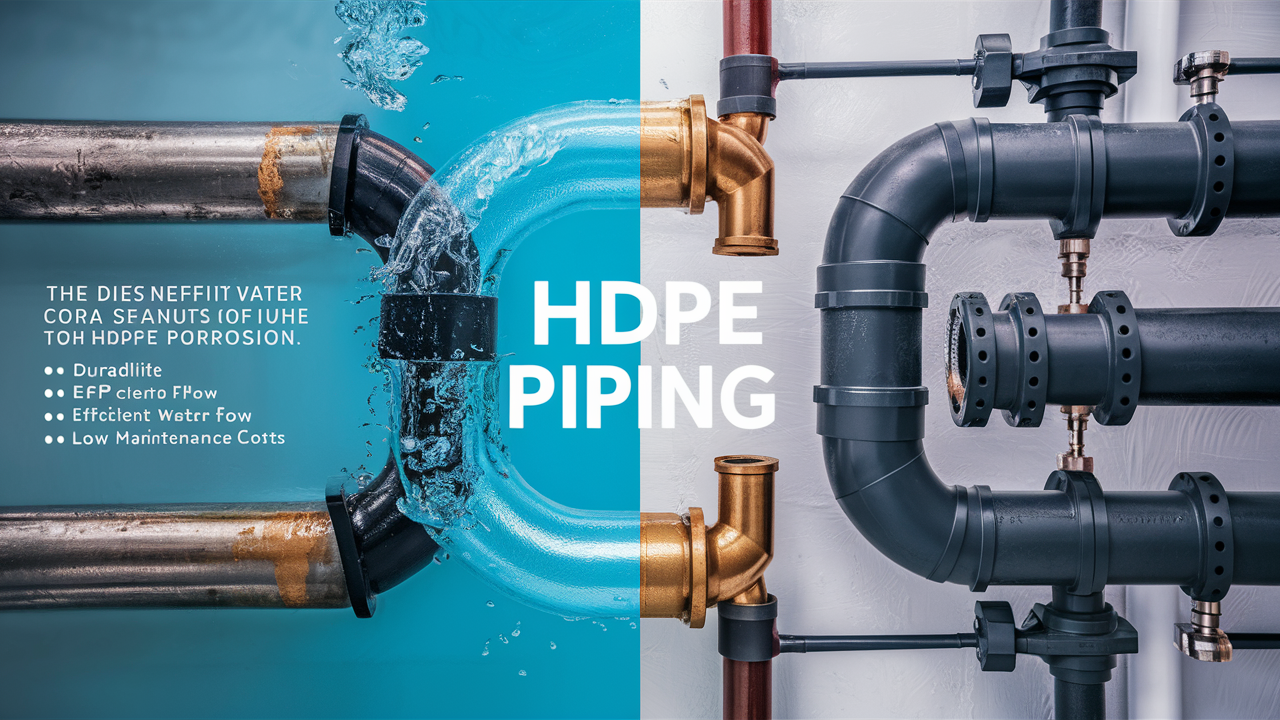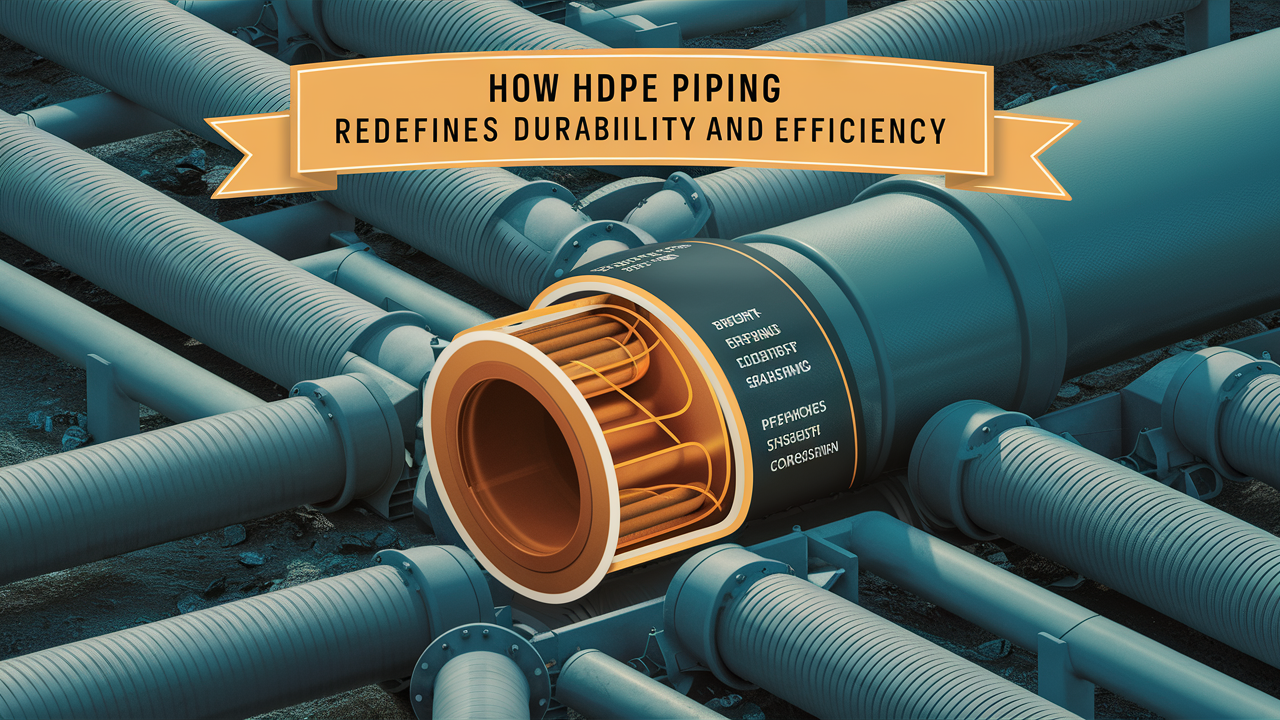How HDPE Piping Redefines Durability and Efficiency
In the modern world of infrastructure and construction, the quest for materials that offer superior durability and efficiency is unending. High-Density Polyethylene (HDPE) piping stands out as a revolutionary solution that meets and exceeds these demands. This article delves into how HDPE piping redefines durability and efficiency, making it a preferred choice in various applications.
Unmatched Durability: The Core of HDPE Piping
HDPE piping is renowned for its remarkable durability. This can be attributed to several inherent properties of HDPE:
- Resistance to Corrosion and Chemicals: HDPE piping is highly resistant to corrosion, unlike traditional metal pipes which are susceptible to rust and chemical reactions. This resistance extends to a wide range of chemicals, making HDPE ideal for transporting various fluids, including corrosive substances.
- High Impact Resistance: The flexibility and toughness of HDPE allow it to withstand high impact without cracking or breaking. This property is especially beneficial in environments where pipes are subjected to heavy loads or potential physical damage.
- Longevity: HDPE pipes have an impressive lifespan, often exceeding 50 years. This longevity is a testament to their ability to withstand harsh environmental conditions, including extreme temperatures and pressures.
- Joint Integrity: The fusion welding process used for joining HDPE pipes ensures a leak-free system. Unlike other piping materials that may develop leaks at the joints over time, HDPE joints are as strong as the pipe itself, ensuring long-term reliability.
Efficiency in Installation and Maintenance
Efficiency is another hallmark of HDPE piping. From installation to maintenance, HDPE pipes offer significant advantages:
- Ease of Installation: HDPE pipes are lightweight and flexible, making them easier to handle and install compared to traditional materials. The flexibility of HDPE allows it to be curved and routed around obstacles with ease, reducing the need for additional fittings and connections.
- Cost-Effectiveness: The installation process of HDPE piping is generally faster and less labor-intensive, leading to lower overall costs. The durability of HDPE also translates to fewer replacements and repairs, contributing to long-term cost savings.
- Low Maintenance: HDPE piping systems require minimal maintenance. The resistance to scaling, biofouling, and sediment buildup ensures that the pipes maintain their efficiency over time, reducing the need for frequent cleaning or chemical treatments.
- Environmental Impact: HDPE pipes are environmentally friendly. They are fully recyclable, and their production and installation have a lower environmental impact compared to other materials. Additionally, the longevity and reliability of HDPE reduce the frequency of replacements, further minimizing environmental disruption.
Applications Across Industries
The versatility of HDPE piping makes it suitable for a wide range of applications across different industries:
- Water and Wastewater Systems: HDPE pipes are extensively used in water and wastewater systems due to their corrosion resistance and leak-proof joints. They ensure clean and safe transportation of potable water and efficient handling of wastewater.
- Agriculture: In agriculture, HDPE pipes are used for irrigation systems. Their flexibility and durability make them ideal for delivering water across large areas, even in rough terrains.
- Industrial Applications: Industries that require the transportation of chemicals, slurries, and other fluids rely on HDPE piping for its chemical resistance and durability. HDPE pipes are also used in mining operations, where they transport minerals and other materials.
- Gas Distribution: HDPE piping is a preferred choice for natural gas distribution due to its high impact resistance and flexibility. The secure joints provided by fusion welding are critical for preventing gas leaks.
Technological Advancements Enhancing HDPE Piping
Recent technological advancements have further enhanced the performance and efficiency of HDPE piping systems:
- Advanced Fusion Techniques: Innovations in fusion technology have made the joining process more efficient and reliable. Automated fusion machines ensure precise control and consistent results, enhancing the integrity of HDPE piping systems.
- Improved Materials: The development of new HDPE resins has resulted in pipes with superior strength and flexibility. These advanced materials enhance the performance of HDPE pipes in demanding applications.
- Smart Monitoring Systems: Integration of smart monitoring systems allows for real-time tracking of the condition and performance of HDPE piping networks. This proactive approach to maintenance ensures timely interventions, preventing potential issues before they escalate.
Conclusion
HDPE piping has indeed redefined durability and efficiency in the piping industry. Its unique properties, combined with technological advancements, make it a superior choice for a multitude of applications. From water and wastewater management to industrial and agricultural uses, HDPE piping offers unparalleled benefits. The combination of durability, cost-effectiveness, and environmental friendliness positions HDPE as the material of choice for the future of piping systems.

FAQs
Q1: What makes HDPE piping durable?
A1: HDPE piping is durable due to its resistance to corrosion, chemicals, high impact, and extreme environmental conditions, along with its leak-proof joint integrity.
Q2: How does HDPE piping enhance installation efficiency?
A2: HDPE pipes are lightweight, flexible, and easy to install, reducing the need for additional fittings and connections, leading to faster and cost-effective installations.
Q3: What are the maintenance requirements for HDPE piping?
A3: HDPE piping requires minimal maintenance due to its resistance to scaling, biofouling, and sediment buildup, ensuring long-term efficiency.
Q4: In which industries is HDPE piping commonly used?
A4: HDPE piping is used in water and wastewater systems, agriculture, industrial applications, and gas distribution due to its versatility and durability.
Q5: How environmentally friendly is HDPE piping?
A5: HDPE pipes are fully recyclable, have a lower environmental impact during production and installation, and their longevity reduces the frequency of replacements, minimizing environmental disruption.


